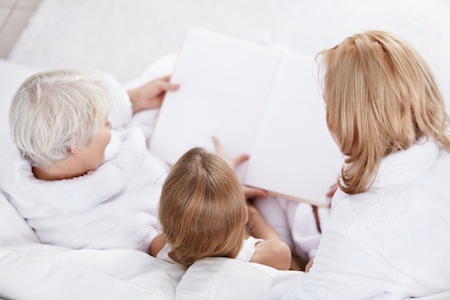Young children always want to hear about the day they were born, but when will adopted children want to know more? Sarah Buttenwieser shares the conversations she has with her 4-year-old adopted daughter.
When photographer Shelly Rotner asked, I was more than happy to participate in her nonfiction picture book about adoption with my toddler daughter. Rotner photographed us snuggling and Saskia played peek-a-boo with her and then it was naptime.
Now that I’m Adopted is out, Saskia thumbs through the pages like a very glossy photo album of her and her friends. She exclaims, “There’s baby Sammy!” Her Vietnamese pal—and classmate—Sammy sits beside his very blond older sisters. The book kind of is a very glossy photo album of her and her friends.
The photograph of Saskia and me hugging reveals how very much we love each other. My being Saskia’s mama means another mama isn’t getting to raise her. It’s a truth that for me tangles gratitude and sadness. As a parent, Saskia’s parent, I’m wondering how to explain that sadness and anger and confusion—hers, her birth mother’s—can exist right alongside love and happiness.
For Saskia’s birth mother, the adoption decision cannot be distilled into a few declarative sentences. Complex, open-ended explanations aren’t appropriate for young children, but someday, those complicated conversations will occur. Meantime, what my preschooler “gets” about adoption is this: She wasn’t in my tummy; she was in her Auntie Cece’s tummy. Questions about why she wasn’t in my tummy or didn’t stay with Auntie Cece haven’t come up…yet. These days, adoption conversation focuses upon bellies or hospitals, and my telling her how tiny she was and how she came into my arms right after she was born. “I loved you instantly,” I say. “I’d been waiting to love you for my whole, entire life.”
I do worry my answers will be inadequate and that my daughter will be overcome with sadness I cannot soothe. I can’t predict how she’ll feel.
Recently, Saskia informed her best friend, “I was born in Caroline’s tummy but my mom and dad were right there at the hospital and they brought me home in the van.” Saskia sounded confident and matter-of-fact. Her friend nodded almost solemnly, her eyes wide and serious. She’s 4. She had assumed, not surprisingly, that Saskia came out of my tummy.
Then, as if to prove that young kids have a greater capacity to hold complicated situations in their minds and hearts than we expect, her friend said, “Me and my sister both have a mama, but I’ve got a papa, and my sister has Auntie Karen.”
The book concludes: “Most children want to hear how they came to their families. ‘Tell me about the day I came home.’ They want to hear it again…and again.” What a wonderful, truthful ending.
Seeing ourselves on the pages of I’m Adopted affirms our openness about adoption. It’s not a public declaration that matters, though. It’s our comfort with the stories—of that day, of all our days—and our willingness to return to them as many times as our daughter wants to hear them. I begin to believe we can hold it all, even the sadness. It coexists with all that love.
Sarah Werthan Buttenwieser plans to be an emerging writer for a very long time (because emerging is more interesting). Her work has appeared in various anthologies, most recently Shari MacDonald Strong’s The Maternal is Political. A frequent contributor to the Daily Hampshire Gazette, she’s also written for newspapers further afield such as The New York Times, Philadelphia Inquirer, Newsday, the Tennessean, and USA Today. Essays and book reviews are posted on Mothers Movement Online and Literary Mama and mamazine and Brain, Child magazine. She resides in Northampton, Massachusetts, with her husband and four children (teen to toddler). You can find her on Twitter at @standshadows.
Related Links:

